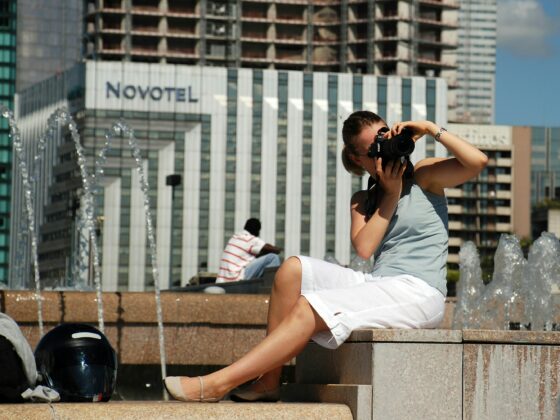
David Lund, a financial consultant for hotels, shares his thoughts on how hotels should approach hotel finance software and tools, and the role technology plays in daily operations, highlighting the skills needed to succeed. With vast experience in hospitality operations, finance, and accounting, David offers his unique view on the hospitality business and advocates financial literacy for hoteliers as one of the most crucial skills to have.
How did your journey in hospitality start?
I grew up in the shadow of the Algonquin Hotel in my hometown of St. Andrews, New Brunswick, in Canada. I ended up working there right out of high school and went on to hotel school afterward. In addition, I’ve worked for Fairmont Hotels, formerly known as Canadian Pacific, for 31 years: Fairmont Banff Springs, Empress, Royal Your, Chateau Frontenac, Hotel Vancouver, and Fairmont San Francisco, plus a four-year stint at our corporate office– those are all my stomping grounds.
Then, 10 years ago, I left the group and started my own business as a financial coach since I had held finance leadership roles during most of my career, such as Controller, Regional Controller, and even a stint as Hotel Manager for a couple of years. I went right back to finance because, in that role, there was never really a finite answer, whereas, in accounting, there needs to be an ending to every month.
It’s not the technology that doesn’t work, it’s people who don’t know how to use it properly.
I’m not an accountant per se, but after all these years I figured I had learned everything I needed to know as to how hotels work regarding their operations accounting. It’s not doing the taxes, nor is it setting up the company structure and all that, but you’re balancing the books for the hotel and keeping department managers on track with their spending, which is a big job, especially in a full-service hotel. But it’s a lot of fun, too, because it’s the hotel business, right?
Tell us a bit about your company, The Hotel Financial Coach.
Most of the controllers in my company weren’t like me, as they mostly were accountants and had never worked in hotels or hotel operations themselves, while I had 10 years of operational experience in Rooms and F&B before ending up in accounting. This gives me a unique perspective as I know what the people in operations have to deal with and why the numbers can be so challenging for them, so I can bring a mix of these two experiences together.
The work I do now at The Hotel Financial Coach includes workshops and teaching individuals what they need to know about finances, but also how to be a leader around numbers, whether you’re the GM, Controller, or department head because money is tricky. And you know, when you’re the boss, you have to make decisions and set deadlines, and you have to deal with numbers, so there’s a lot of fear involved for some people. Also, many people misuse the financial clout they may have as a functional leader, therefore a lot of my job is teaching leaders how to deal with numbers and how to get their people to want to do the work necessary with their numbers.
Given the large amount of hotel finance software available today, how do you recommend hoteliers choose?
I’m not anti-technology at all, I do believe it’s great, but we’re confused in our industry because of the structure of the brands, the owners, and the management companies nobody has a clear line of sight to make the necessary investment in hospitality tech. In a full-service hotel, there are 40, 50, or even 60 applications running at the same time, and half of them talk to each other, but the other half don’t. The average person wouldn’t even know that there are so many applications necessary to manage the hotel.
The technology in hotels, the hotel finance software included, is what I would call a dog’s breakfast, or a mess, because, if you’re a brand managing hotels for an owner and request for a replacement of the back office accounting system, you’d usually get turned down by the owner who doesn’t see the need to spend that money, and a huge back-and-forth discussion ensues. It’s hard to get owners to spend money on technology because they don’t see the return, and in franchises, the franchisees aren’t too interested in paying for the franchisors’ programs as it’s expensive enough as it is to pay for the monthly fees. It’s incredible how, even in some big hotel companies, what’s arguably the most important system – the PMS – is still a DOS-based system to this day. This is due to an unwillingness to improve the technology and, quite frankly, because they can’t get all their owners to agree on a platform as there are so many brands and things going on. Therefore, when coaching and mentoring people, we focus first on teaching them how to do things manually, so they understand what the technology is actually doing when they use it.
For instance, if we’re talking about scheduling – and labor is the single biggest expense in the hotel business – what I endeavor to teach them is how to schedule using productivity, how to calculate that productivity, and EFTEs (equivalent to full-time employees). That way, when they do get a system, they understand what the system is doing and use it properly. The same goes for controlling expenses, where I teach them to use purchase orders so that they understand the fundamentals and can make an informed decision themselves as to which tech solution is best for their needs.
What is important to note about a hotel’s financial needs?
People ask me all the time what’s the best forecasting and budgeting tool, and my answer is always that they are getting ahead of themselves. What’s crucial is that managers understand the fundamentals before selecting any hotel finance software. New solutions should not be implemented before good financial hygiene is established: doing regular forecasts, budgets, and tracking payroll expenses. For such critical information, letting technology do it all for you is not enough.
Traditionally, those working in operations, such as the front desk, kitchen, or housekeeping departments, already have a hard enough time with their colleagues and guests, and the last thing they want is to have anything to do with numbers. In fact, they tend to run in the opposite direction, so what you need to do is figure out how to get them to want to look at numbers. So in the workshops I do, I really zero in on the fact that dealing with numbers is the currency for advancement in their career, as once someone is good with their budget and forecast, it shows they are ready to be promoted to the next step up. Similarly, it’s the currency to get your hotel to become more profitable. Owners see it clearly, and most GMs see it, but most of the time, your average line manager doesn’t see it until they’re confronted with it.
There are three pillars that should be treated equally: guest service, colleague engagement, and money.
Additionally, knowing which numbers to keep track of and use is important. Software will calculate many metrics, such as the flow-through, but I’d say that 99% of hotel companies out there don’t include it in their financial statements, either because they don’t realize that they can or because they don’t understand how much better it would make the reading of those statements. Moreover, the impact of having flow-through for rooms and F&B profit, non-ops costs, GOP flow-through, and so on is huge and often understated. Again, things like EFTEs and productivity measurements can all be put into your financial statements, but people don’t. Coming from a background of working at Canadian Pacific, which was a railway company run by engineers & accountants for the last 150 years, I learned the hotel business from that numbers perspective, we measured everything.
Have you seen any effect of the COVID-19 pandemic on financial processes?
We are fortunate to have the books on the Uniform System of Accounts for the Lodging Industry, or USALI, which is coming out in its 12th edition. It’s designed to produce a financial statement that’s consistent and set up by each department of a hotel operation, all leading up to the GOP. Sadly, most individual hotels and even some hotel companies don’t set up their financial statements that way, and many of the people who ask for my help have never heard of the uniform system. Many hoteliers want to save their way to profitability, but they don’t invest in systems and in good people, especially in training and developing them, and the pandemic was a great example of how messed up our business is. We let all of our people go, but why would we do that? We’re a people business and should have realized that this, too, would pass and we’d need our people more than ever when they come back. That’s why current technology is such a mess, why financials are such a mess – because many owners and stakeholders don’t have very good business acumen, to put it bluntly. To look at it another way, they want to save their way to prosperity.
What’s your advice for a hotel upon realizing they need to correct some of these errors?
I always tell people in our business that there are three pillars that should be treated equally: guest service, colleague engagement, and money. In everything we do, we must balance those three things. When hiring a new manager, it’s important to make sure that they are good with guests, a good leader to their colleagues, and they’ve got to know their numbers. They must understand the business, why those financial statements are so important and the budget and forecasts, and how to lead their people around the money piece of the puzzle. Each department must have a manager that has their act together and can do their job without spending all of the hotel’s money.
Also, most people think that money is like math, with an answer to each question, but it’s the opposite. The only thing we know about the budget is that it is wrong, it’s never going to be exactly right. Also in our business we rarely train people and develop them with numbers as a leadership quality, this is a big mistake and opportunity.
When brands and management companies are moving people around, they need them to be trained and developed, and mandating financial leadership training is something that would benefit everyone, from the leader, to the brand/management company, all the way to the hotel owner. As for technology, a lot of the problems it faces are actually people problems. It’s not the technology that doesn’t work, it’s people who don’t know how to use it properly, and we could greatly eliminate that if we had leaders who have gone through the proper training. Getting the most out of software or applications is the quality of a leader who will use it to move the business forward instead of making excuses and blaming the systems.








